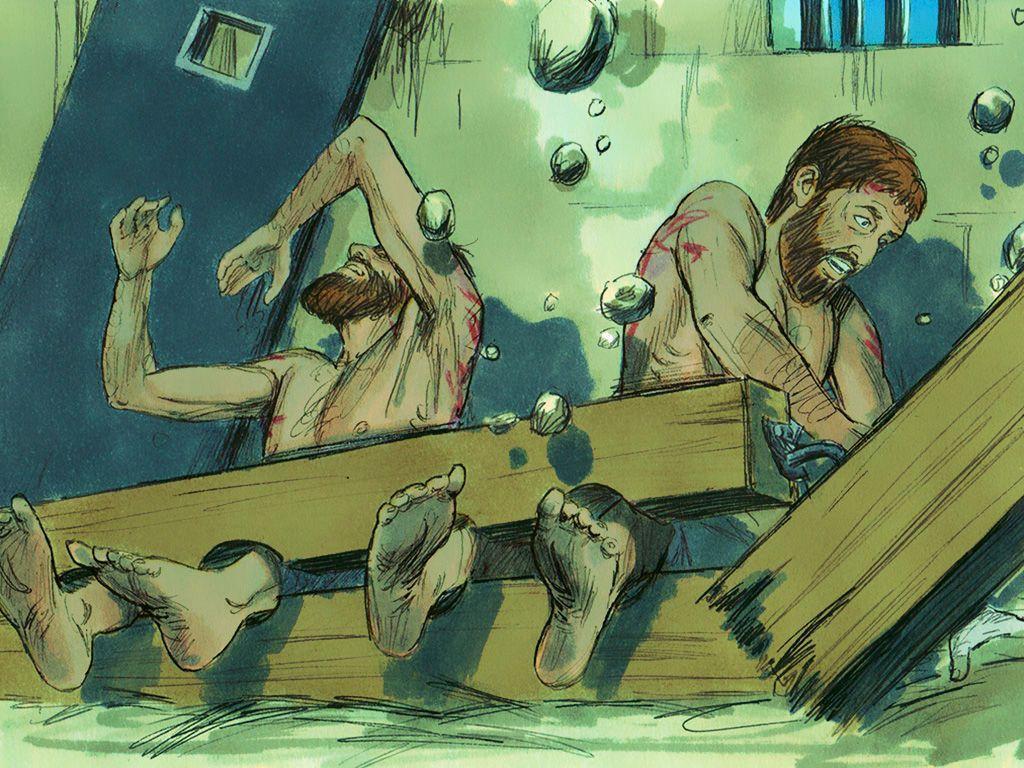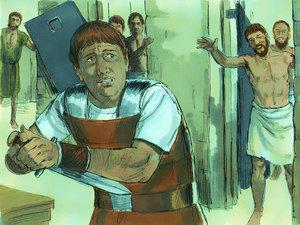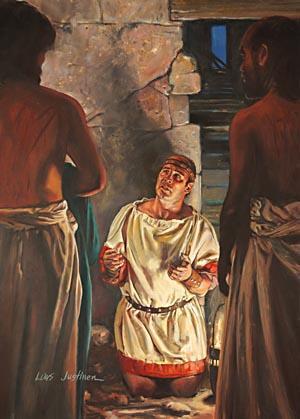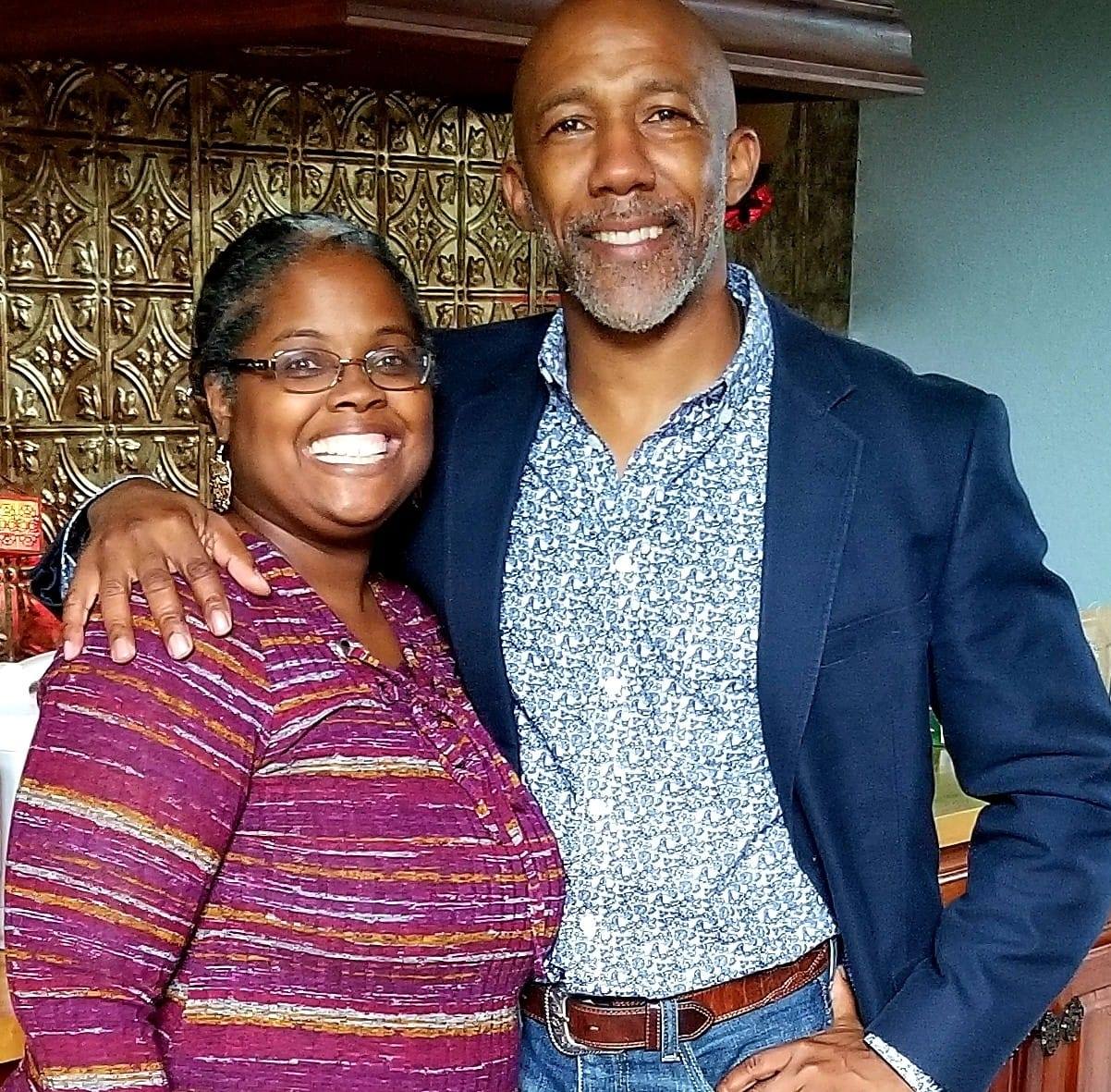Called to Conflict and Deployed into Difficulty — Part 3 of 3 (Acts 16:25-34)
Introduction
Figure 1 – Before starting their prison concert Paul takes a moment to point out the finer features of the architecture.
Sometimes God does not deliver us from difficulty. No, instead of helping us to avoid clear and present dangers He sends us into them. In fact, truth be told, the conflicts and subsequent captivity we find ourselves in are often part of His bigger plan for deploying disciples behind enemy lines. If you are willing to accept it, the Lord allows persecution and even prison time with the goal of getting the gospel to places nobody in their right mind wants to go.
That is what He does with Paul and Silas. They are allowed to be pestered by an evil spirit, persecuted by slave owners and magistrates, punished with a brutal beating that they did not deserve, and put into prison. Why? God has goals. His goal was to (1) promote the preaching of Christ to the incarcerated and (2) save whole households from the power and penalty of sin. By sending Paul and Silas to jail the Almighty achieved His aims. Stay with me for just a little longer and we will see how the grace of God deploys godly people into the worst conditions in order to win the lost. In the story of Paul and Silas we become familiar with our own situations and perhaps see for the first time that many of our difficulties are deployments.
Deployed to the Dungeon (Acts 16:25-28; Matthew 26:30)
25 But at midnight Paul and Silas were praying and singing hymns to God, and the prisoners were listening to them. 26 Suddenly there was a great earthquake, so that the foundations of the prison were shaken; and immediately all the doors were opened and everyone’s chains were loosed. 27 And the keeper of the prison, awaking from sleep and seeing the prison doors open, supposing the prisoners had fled, drew his sword and was about to kill himself. 28 But Paul called with a loud voice, saying, “Do yourself no harm, for we are all here.”
Previously in our reading of Luke’s record we saw Paul and Silas suffer for reasons rooted in racism and an exorcism that ruined a business. They were dragged to the magistrates of Philippi, stripped, beaten, and then put into an inner prison with their feet in stocks. In all of this there is no sign of God intervening to deliver them from difficulty. There is no mention of God, the Lord Jesus, or the Spirit when they were being falsely accused, assaulted, and then incarcerated.
Time has passed since they were berated for doing good and then beaten without a trial. It was day when the arrest and beating took place; now it is midnight. Notice, saint, what they were doing: Paul and Silas were praying and singing hymns to God (Παῦλος καὶ Σιλᾶς προσευχόμενοι ὕμνουν τὸν θεόν). Is that what you would have been doing at that moment?
We must see that their activity was not sporadic but coordinated and intentional. The verb for singing hymns (ὑμνέω) is in the imperfect; it was an ongoing activity for the two men. They kept on singing. Their feet are in stocks and their backs are covered with bruises and lacerations from being struck with rods. But they kept on singing.
And what of the other prisoners? The listened as the beaten-but-not-broken men blessed the Lord. They listened as Paul and Silas prayed. (They may have even heard them praying for their enemies.) They listened as the inner prison prayed and praised God.
Were listening to them (ἐπηκροωντο αὐτων [epēkroōnto autōn]). Imperfect middle of ἐπακροαομαι [epakroaomai]. Rare verb to listen with pleasure as to a recitation or music (Page). It was a new experience for the prisoners and wondrously attractive entertainment to them. (Robertson, 1933, Acts 16:25)
The verb used to indicate they were listening has the connotation of someone eagerly paying attention with the goal of getting something for themselves.
24.61 ἐπακροάομαι: to listen to, with the probable implication of one’s own interest (Louw, 1996, p. 282)
There is a stark contrast between the usual behavior of men falsely accused and physically brutalized and the conduct of the two fellows in the inner prison. The usual sounds would include groans, complaints, cursing, and demands that the gods do something to avenge them. I imagine their fellow prisoners saying things like, “These men are physically bound. But their spirits are free. And who is Yeshua? Why are they so glad to serve Him in this way? How does the blood of Yeshua remove the stain of sin? Why did they crucify Yeshua? How did He rise again on the third day? Could Yeshua save me? It seems like Yeshua can forgive and save if you receive him?… How do I receive Yeshua?” The gospel was being sung and the faith of these two Jews could be heard in their prayers. The prisoners were listening with the goal of getting for themselves some of what made the caged birds sing.
But the praying, praising, and piqued interests were interrupted. Suddenly there was a great earthquake (Acts 16:26). How great was it? So great that the foundations of the prison were shaken.
If the prison was excavated from rocks in the hillside, as was often the case, the earthquake would easily have slipped the bars of the doors loose and the chains would have fallen out of the walls. (Robertson, 1933, Acts 16:26)
The order of words is more important in English than it is in Greek. If word order is not kept in a certain sequence in English, sound like Yoda you will. In Greek word order is used primarily for emphasis. In the ordering of words for v. 26 we are told that the most striking result of the earthquake was the opening of the doors; of next import was the fact that the chains were loosed. It was not a coincidence that Paul and Silas are praying, there is an earthquake, and all doors are open and everyone’s chains are loosed.
ἠνεῴχθησαν δὲ παραχρῆμα αἱ θύραι πᾶσαι καὶ πάντων τὰ δεσμὰ ἀνέθη (Nestle, et al, 1997, Acts 16:26)
But the original readership of Acts is not surprised. By this time in the narrative a miraculous delivery from confinement has happened twice before: (1) to the apostles in Acts 5:19-26 and (2) to Peter in Acts 12:5-19. Miraculous delivery from confinement has become a common feature in the book of Acts. The deliverance of Paul and Silas here is most similar to the rescue of the apostles’ (Acts 5:19-26) for two reasons:
- Lead-In to Witnessing – The retelling of how the apostles were delivered and how Paul and Silas were delivered focus very little on the rescue. The aim of the writer is to have the reader see the power at work to bring about their freedom and what they do with it. Polhill writes, “The miracle served not to deliver them but rather to deliver the jailer. It served as the basis for Paul and Silas’s witness to him and for his conversion.” (Polhill, 1992, p. 355)
- Willingness to Witness – In the earlier rescue the apostles did not run away to another city. In obedience to the word of the angel they return to the temple to teach. And when the apostles were asked to return for their scheduled trial they did so willingly. Paul and Silas do not use their freedom to flee the scene; they use the situation to save the jailer and share their faith.
The jailer’s mind, seeing the prison doors open and supposing the prisoners had fled, went immediately to suicide. Earthquake or not the penalty for losing the prisoners would be the same. Rather than die at the hands of the Romans for his failure, the jailer was about to kill himself.
Knowing he would suffer badly at the hands of Roman law, he chose to draw his own sword and, true to his Roman calling, was about to kill himself for failing his responsibilities. Again, in that day, the one in charge of a prisoner who had escaped would have to die (Acts 12: 19; 27: 42). (Fruchtenbaum, 2020, Kindle Locations 6152-6154)
At this point the character of the kingdom comes forth in a way that forces the jailer to realize that the men are indeed the “servants of the Most High God, who proclaim to us the way of salvation.” (Acts 16:17) It was not enough that the men stayed; they had somehow used their influence to cause the prisoners to do the same. And, though they could have simply sat quietly as the jailer who put them in stocks killed himself, they intervened to prevent the death of the one who had played a part in their mistreatment.
While he could see nothing as he looked into the darkness, those inside could see his figure silhouetted in the doorway and could see what he was about to do. Not only were Paul and Silas still there, but they had apparently restrained the other prisoners also. There was something uncanny about these two men! (Bruce, 1988, p. 317)
What are we to see in this? See that the conflict was used by the Lord to conduct disciples to a place where they could have greater impact. What seemed to be conflict because of their relationship with God with no help from God was actually a deployment to help those who were in conflict with God.
An unpleasant path involving persecution and ending in prison is an often-used implement of God, a favorite tool of the Almighty, and an exceedingly effective tactic (how) for the strategy (what) of placing saints where they can be witnesses (why) to the lost. (Consider Joseph, Daniel, and Dr. Martin Luther King, Jr.) In the darkness of a dungeon and stark discomfort of stocks Paul and Silas become even more missional.
The Outcome of Ongoing Outreach (Acts 16:29-30)
29 Then he called for a light, ran in, and fell down trembling before Paul and Silas. 30 And he brought them out and said, “Sirs, what must I do to be saved?”
Was it true? Was the news that the prisoners were all still there true? In Texas we trust… but verify. To ascertain the truthfulness of Paul’s claim the jailer called for a light. He then ran in and was able to assess the veracity of what he had been told. It was then that he fell down trembling before the men who had saved his life. He is now able to see that they are, as said by the spirit through the girl, more than meets the eye. Immediately he must have called to mind how he had treated them as he took them to the inner prison and as he put their feet in the stocks. He had no idea that the vagabonds were VIPs.
Trembling for fear (ἐντρομος γενομενος [entromos genomenos]). “Becoming terrified.” The adjective ἐντρομος [entromos] (in terror) occurs in N. T. only here and 7:32 and Heb. 12:21. (Robertson, 1933, Acts 16:29)
Maybe the jailer had heard about the demoniac’s declaration — Paul spoke of the way of salvation (v. 17). Maybe news about the new church and the preacher who started it had reached his ears. Maybe Paul and Silas’s praying and praise songs were the last thing he had heard before he fell asleep. “These crazy Jews. They just don’t know when the quit.” He did not know that they were not quitters; Paul and Silas were more than conquerors (Romans 8:37). But he is going to learn today. Through the earthquake and the prisoners who stayed put God has effectively said, “Can you hear me now?” And the jailer, let us call him Jay, said in response “What must I do to be saved?”
You have to see that the difficulty was a deployment and the priority of Jesus was the saving of the jailer. Let us also notice that so many of the things we deem necessary for evangelism were totally absent. But present was the power of the Spirit, missional thinking, and now a ready heart.
The culmination of our efforts are not confined to well-planned conferences, Sunday morning services, carefully orchestrated outreaches, Christian concerts, and other convenient times for communicating the gospel. God deploys disciples with the gospel where we are not trying to go and when they are not trying to be there. But in the dank and dark places the lights of the Lord are easier to see and appreciate, the message of grace is easier to hear and understand, and the sinner’s need is easier to clearly articulate. In the untimely moments and unseemly places Yeshua would have us there when people he is saving finally ask, “What must I do to be saved?”
Delivering the Message (Acts 16:31-32)
31 So they said, “Believe on the Lord Jesus Christ, and you will be saved, you and your household.” 32 Then they spoke the word of the Lord to him and to all who were in his house.
The response of Paul and Silas to the jailer’s question is so simple that we have trouble with it. To make it less mysterious we have added measurables and indicators to the requirements of salvation. But salvation is by grace alone, through faith alone, in Christ alone. Anyone who believes on the Lord Jesus Christ will be saved.
Notice the absence of the commonly stated requirements of our day:
- Praying to Receive Jesus
- Asking to Be Forgiven of Your Sins
- Coming Forward at Church
It seems to me that if these things were required they would have been mentioned as part of the reply. (They are not mentioned here or in the conversation with Philip the evangelist and the Ethiopian eunuch of Acts 8:26-40.) A common mistake in the handling of these verse 31 is the overreach. It happens when we say that the jailer’s faith would have saved the household. This is not what Paul and Silas meant.
Sometimes this verse is misinterpreted to mean that if one person in a family is saved, the others will be saved sooner or later as well, but too many believers have seen members of their families die without the Lord. Paul did not promise that the jailer’s family would be saved. The phrase “believe on the Lord Yeshua the Messiah” applied to both the jailer and his house. Both needed to believe in order to be saved. (Fruchtenbaum, 2020, Kindle Locations 6166-6169)
The simple requirement to believe on Jesus was explained more fully. Important things like (i) prophecies concerning Yeshua, (ii) the birth of Yeshua, (iii) the earthly ministry of Yeshua, (iv) the persecution and murder of Yeshua, (v) the certification of Yeshua’s claims through resurrection, and (vi) the importance of placing faith in Yeshua. All of their conversation about the word of the Lord to the whole household would have pointed to Yeshua.
The Consequence of Conflict Running Its Course — Conversions (Acts 16:33-34; [Acts 5:54-57; 8:1-3; 9:1-6; 9:10-19; 9:20-22])
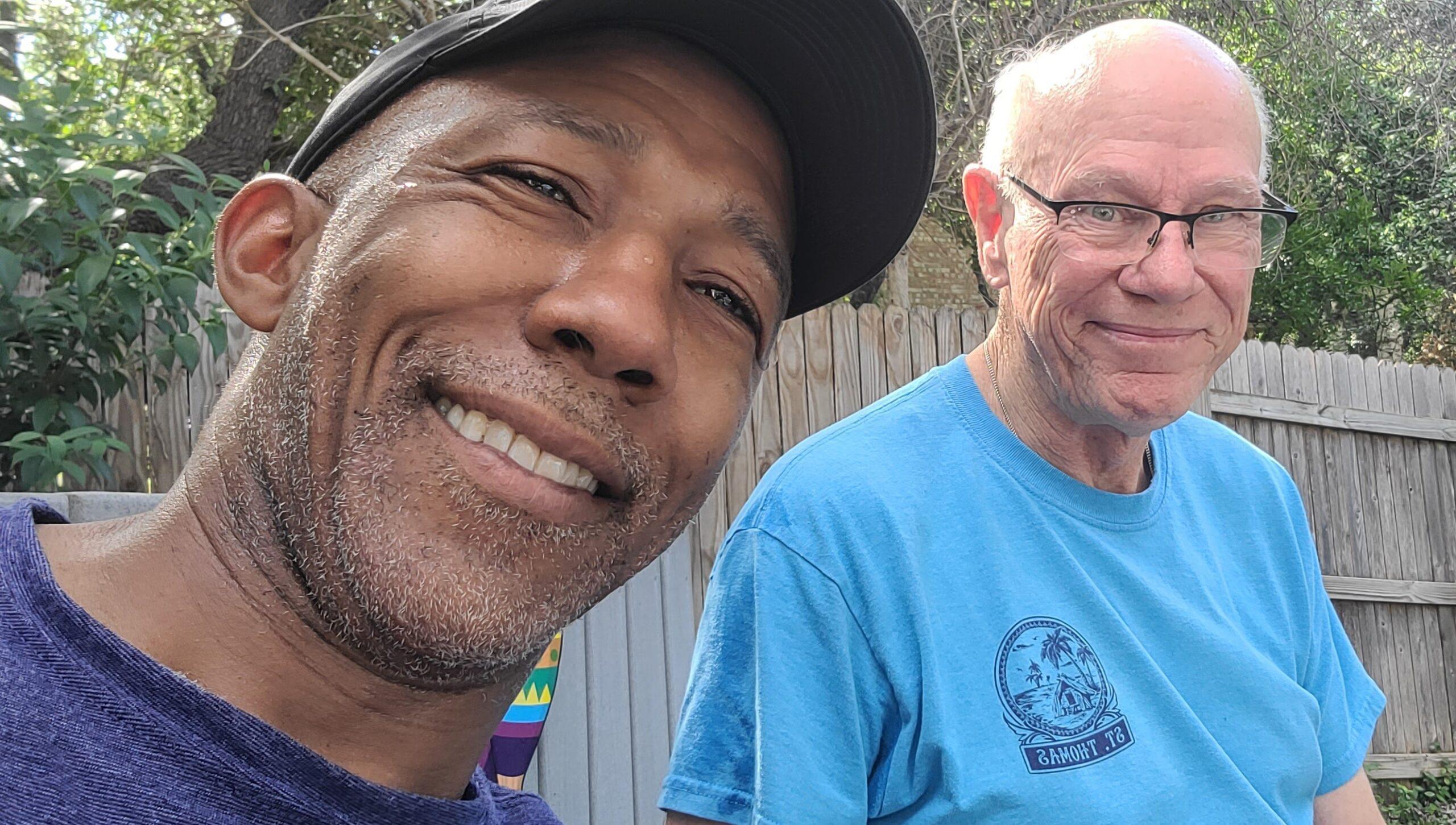
Figure 5 – Lt Col Jim Voss (Retired) explained the military concept of a deployment to me. Going to specific place, for a specific time, for a specific task. Comfort is not a concern for the sender or those being sent.
33 And he took them the same hour of the night and washed their stripes. And immediately he and all his family were baptized. 34 Now when he had brought them into his house, he set food before them; and he rejoiced, having believed in God with all his household.
Did he believe it? Did his household receive it? That is, did the jailer and his household believe on Yeshua for salvation? The confirmation is seen in their conduct. The immediate consequence of believing was believer’s baptism. This is not getting baptized in order to be saved; it was the outworking of the fact that they were saved. All of them!
Throughout Luke’s story he focused attention on the various signs evidencing conversion (i.e., speaking in tongues, expressions of joy, and hospitality). Here the evidence of conversion is the jailer’s washing of the apostles’ wounds. There then took place an even more significant “washing,” when the jailer’s family was baptized. (Polhill, 1992, p. 356)
Notice the immediate obedience. The Bible knows nothing of the weeks, months, and years of procrastination that have become so common in our churches today. If you are reading this and realize that your faith has been placed in Jesus for salvation, if you have not already, you should immediately follow it up with baptism. Stop looking for a convenient moment. Do it and do it now! If you need help finding someone to help you get baptized contact your pastor. But let there be no more delaying. God likes immediate obedience.
See also the other sign of being saved — the love of the jailer for Paul and Silas.
Then the jailer treated Paul and Silas in a most unusual fashion for prisoners. He took them into his house and fed them at his own table. They were no longer prisoners in his eyes; they were brothers in Christ. (Polhill, 1992, p. 356)
The jailer is now expressing his new nature for his new family:
14 We know that we have passed from death to life, because we love the brethren. He who does not love his brother abides in death. (1 John 3:14)
Conclusion
The mission of bringing the gospel message, grace of God, and character of the kingdom to Philippi was bigger than anyone realized. (Rigors that would be faced were not mentioned in the Macedonian call mentioned in Acts 16:6-10.) It went beyond ministry to the women praying by the river. It went beyond the deliverance of a demon-possessed girl. Paul and Silas were called into conflict and deployed to places a disciple would not want to go. But the love of God for the people in those places insisted. May we begin to see our presence in difficult places through a missional lens – some difficulties are deployments used to bring about the deliverance of those whom God loves. In the midst of such messes let us be like Paul and Silas, praying and praising God.
In His grip by His grace,
Roderick L. Barnes, Sr.
References
Aland, K., Aland, B., Karavidopoulos, J., Martini, C. M., & Metzger, B. M. (2012). Novum Testamentum Graece (28th Edition). Deutsche Bibelgesellschaft.
Bruce, F. F. (1988). The Book of the Acts (p. 317). Wm. B. Eerdmans Publishing Co.
Fruchtenbaum, Arnold G. (2020). Commentary Series: The Book of Acts (Kindle Locations 6152-6154). Ariel Ministries.
Nestle, E., & McReynolds, P. R. (1997). Nestle Aland 26th Edition Greek New Testament with McReynolds English Interlinear (Ac 16:26). Logos Research Systems, Inc.
Polhill, J. B. (1992). Acts (Vol. 26). Broadman & Holman Publishers.
Robertson, A. T. (1933). Word Pictures in the New Testament. Broadman Press.

